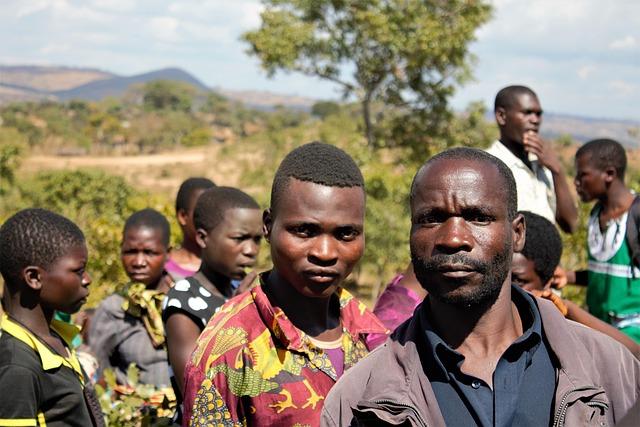In a notable move aimed at bolstering resilience against climate-related shocks, the African Development Bank Group (AfDB) and the African Risk Capacity Group (ARC) have announced an $11.2 million insurance payout to the Government of Malawi. This financial assistance, part of the ARC’s innovative insurance program, comes as a timely relief to a nation grappling with the adverse effects of climate change and unpredictable weather patterns. The funding will support recovery efforts following devastating natural disasters, highlighting the critical role of financial instruments in enhancing Africa’s adaptive capacity to climate impacts. As Malawi navigates the complexities of sustainable development amid growing environmental uncertainties, this collaboration signifies a vital step towards fostering economic stability and safeguarding vulnerable communities.
African Development Bank Group Collaborates with African Risk Capacity Group for Insurance Payout to Malawi
The African Development Bank Group (AfDB) and the African Risk Capacity (ARC) Group have come together to deliver a transformative $11.2 million insurance payout to the Government of Malawi. This collaboration comes as a vital lifeline for the nation,which has been grappling with severe climatic challenges,particularly cyclones that threaten food security and exacerbate poverty. The funds will assist in immediate recovery efforts, ensuring that affected communities can regain their footing while reinforcing national resilience against future climatic shocks. Through this strategic partnership, both organizations underscore their commitment to safeguarding vulnerable populations in Africa and promoting sustainable development.
This payout is part of a broader initiative aimed at enhancing the capacity of African nations to respond effectively to climate-related disasters. Key objectives of the collaboration include:
- Strengthening disaster preparedness: Providing support for the development of early warning systems and immediate response capabilities.
- Improving food security: Ensuring that agricultural outputs can recover swiftly after adverse weather events.
- Building financial resilience: Developing insurance schemes that can buffer against the socio-economic impacts of climate change.
By leveraging insurance mechanisms, both the AfDB and ARC are positioned to offer innovative solutions that not only address immediate needs but also foster long-term sustainability in Malawi and beyond.

Significance of the $11.2 Million Payout for Malawi’s Resilience Against Climate Risk
The recent issuance of an $11.2 million insurance payout to Malawi marks a transformative step in the nation’s fight against climate vulnerability. As climate change continues to exert pressure on African economies, this financial injection will enhance the resilience of communities that are heavily reliant on agriculture. With Malawi often facing the brunt of climate shocks, such as drought and floods, this payout will serve as a critical buffer, enabling the government to implement immediate responses to emerging challenges. The significance of this funding extends beyond just financial relief—it’s a proactive approach to fortifying the nation’s capacity to adapt to climate-induced emergencies.
The benefits of this payout can be manifold, fostering stability and long-term development through several avenues:
- Infrastructure Development: The funds can be utilized to improve irrigation systems, reducing dependency on erratic weather patterns.
- Community-Based Initiatives: Local programs aimed at sustainable farming practices can be launched, promoting food security.
- Emergency Response Preparedness: Investments in disaster response infrastructure can be bolstered, enhancing reaction times during crises.
- Awareness and Education: Funds can facilitate educational campaigns about climate resilience, empowering communities to adapt.

Evaluating the Role of Insurance Solutions in Enhancing African Nations’ Disaster Preparedness
The recent issuance of a considerable insurance payout by the African Development Bank Group and the African Risk Capacity Group underscores the pivotal role that tailored insurance solutions can play in bolstering disaster preparedness across African nations. The $11.2 million compensation to Malawi’s government is not merely a financial transaction; it represents a proactive approach to managing the impacts of climate-related events, particularly as extreme weather conditions become increasingly frequent. By providing a buffer against the economic fallout that accompanies natural disasters, such solutions enable governments to implement timely recovery measures, ensuring critical services and infrastructure remain intact in the face of adversity.
Effective insurance mechanisms are essential to establishing a framework for disaster resilience. Some key benefits include:
- Rapid Response: Insurance payouts can facilitate swift governmental action in times of crisis.
- Financial Stability: Risk transfer mechanisms help stabilize national budgets affected by unforeseen disasters.
- Investment in Resilience: With dependable funding, countries can invest in infrastructure and preparedness initiatives that mitigate future disaster risks.
As African governments increasingly recognize the necessity of these innovative financial instruments, it becomes evident that such partnerships could substantially enhance disaster readiness and ensure a more sustainable development trajectory across the continent.

Impacts of the insurance Payout on Malawi’s Agriculture and food Security Initiatives
The recent $11.2 million insurance payout from the African Development Bank Group and the African Risk Capacity Group marks a significant turning point for Malawi’s agricultural sector. The funds will primarily assist in mitigating the adverse effects of climate change, particularly in areas severely impacted by droughts and floods. With such financial support, the government aims to enhance its capacity to respond to natural disasters, thereby helping local farmers to recover and sustain their livelihoods. Key initiatives that will benefit from this payout include:
- Investment in resilient agricultural practices: Funds will be allocated to programs that promote climate-smart agriculture, which enhances productivity and reduces vulnerability.
- Strengthening of food security initiatives: The payout will bolster food distribution systems, ensuring that food reaches those most affected by climate-related issues.
- Support for smallholder farmers: Direct assistance will be provided to farmers, including training on best practices and access to improved seeds.
Moreover, the insurance payout is expected to catalyze additional investments in the agricultural sector. By demonstrating the viability of low-cost insurance solutions, it could encourage more private sector involvement in agriculture, leading to sustainable development and long-term food security. A projected allocation of these funds illustrates the multifaceted approach that will be undertaken:
| Focus Area | Funding Allocation ($ Million) |
|---|---|
| Climate Resilience Programs | 4.0 |
| Food Distribution Enhancement | 3.5 |
| Support for Smallholder Farmers | 2.5 |
| Research and Development | 1.2 |

Strategic Recommendations for Future Collaborations between Development Banks and Climate Risk Initiatives
To enhance the effectiveness of future collaborations between development banks and climate risk initiatives,several strategic recommendations can be implemented. Firstly,establishing a robust framework for data sharing and clarity is crucial. This can be achieved through the following approaches:
- Creating centralized databases to track climate impact and insurance outcomes.
- Encouraging open access to climate risk modeling tools and financial analytics.
- Regularly publishing reports that reflect the efficacy of insurance payouts in mitigating losses.
moreover, it is indeed essential to strengthen partnerships with local stakeholders to ensure that initiatives are tailored to specific regional needs. Strategies could include:
- Engaging with community leaders to identify vulnerabilities and develop localized risk management strategies.
- Facilitating capacity-building workshops that empower local governments and organizations to implement climate adaptation measures.
- Implementing feedback loops that allow for adaptive learning and adjustment of risk initiatives based on real-world outcomes.

Lessons Learned from the Malawi Payout: Enhancing Risk Management in African Development policies
The recent $11.2 million insurance payout to the government of Malawi by the African Development Bank Group and the African Risk Capacity Group serves as a critical case study in improving risk management strategies within African development policies. This payout highlights the importance of integrating risk assessment and insurance mechanisms into developmental frameworks, ensuring that countries are better equipped to handle climate-related shocks and othre unforeseen financial stresses. The operational lessons learned emphasize the need for adaptive policies that respond to local conditions,leveraging innovative financing solutions to address vulnerability.
Key takeaways from the Malawi payout experience include:
- Proactive Risk Assessment: Countries must conduct comprehensive analyses of climate risks that affect their economic stability.
- Partnerships and Collaboration: Building strong alliances between governments, insurers, and development organizations enhances preparedness and response efforts.
- Community Engagement: Involving local populations in the design and implementation of risk management strategies ensures that interventions are contextually relevant and sustainable.
- Adaptability in policy Design: Policies must be adaptable to changing conditions, allowing quick adjustments in the face of new challenges.
| Aspect | Impact |
|---|---|
| Insurance Mechanisms | Provide immediate financial relief and aid recovery efforts |
| Risk Identification | facilitate targeted interventions and resource allocation |
| Stakeholder Engagement | Encourage local ownership of resilience initiatives |

The Way Forward
the recent declaration of an $11.2 million insurance payout to the Government of Malawi by the African Development Bank Group and the African Risk Capacity Group marks a significant step in providing vital financial support to one of the region’s vulnerable nations.This initiative not only underscores the importance of innovative financial mechanisms in addressing the economic impacts of climate change but also highlights the collaborative efforts within the African continent to fortify resilience against natural disasters. As Malawi faces ongoing challenges posed by extreme weather events, such assistance will be crucial in facilitating recovery and rebuilding efforts, enabling the government to deliver essential services and support to affected communities. the partnership between these organizations serves as a beacon of hope and a model for future interventions aimed at enhancing food security and promoting sustainable development across Africa.







